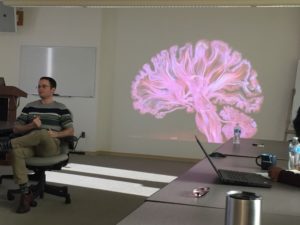by Buck Institute
April 11, 2019 . BLOG
The need for more conversations between patient, research, and medical communities
An Interview with Parkinson’s Patient Advocate Benjamin Stecher
By: Minna Schmidt, University of Southern California, PhD Student
Benjamin Stecher was living in China at the time he was diagnosed with Parkinson’s disease (PD) at the age of 29. Realizing that he wanted to learn more about PD and how he can manage his symptoms, Ben left China at 32 and embarked on a journey that led him to travel around the world, meeting with scientists to discuss research related to PD, and interviewing them for his website, Tomorrow Edition. Ben also co-founded the Parkinson’s Research Advocacy Group, and currently blogs for the Journal of Parkinson's, and serves as a patient advisor to the World Parkinson’s Congress (WPC) and the Ontario Neurodegenerative Research Institute (ONRDI.) Ben frequently shares his experiences about PD and what he has learned from research by giving talks, running workshops, and consulting for pharma, biotech, academia, and patient organizations.
On February 5th, 2019, Ben held a workshop for Buck researchers where he spoke about the challenges ahead, how those with PD cope with their condition, and how education can help both patients and researchers tackle this disease.
~~~
Ben was diagnosed with Parkinson’s after he noticed a tremor in his hand.
“One of my initial reactions was to go about life as usual,” Ben said. “But, as time went on, what bothered me most was my own ignorance of the disease.”
For Ben, learning more about PD has allowed him to cope better with his condition.
In describing this perspective, Ben notes: “I look at my hand and see that it is shaking, and I think of all of the things that are going wrong in my brain that are making this happen … but I also think of all the things that are going right!”
Overall, Ben explains that those with PD need to make a lot of difficult decisions about their medical care. Although medical doctors play a very important part in this process, they are not able to understand a patient’s “particular strand of disease” as well as the patient can.
Parkinson’s is a highly individualistic disease. There isn’t one specific diet or exercise that helps everyone with PD, so Ben says that patients end up doing a lot of their own experimenting to determine what works best. Learning more about the biology of PD has helped Ben feel more empowered in this process of making decisions about treatment and therapeutic approaches.
In his own findings, Ben has experimented with many different supplements (he found that Beta-hydroxybutyrate, fish oil, and NAD+ helps), and tries to eat moderate amounts of food, avoiding eating too much animal protein, dairy, sugar, and processed food. But above all, Ben finds that the best medicine is exercise. “I never feel as good as after a really intense workout,” Ben says.
In fact, while in the Bay Area, Ben stopped by the RockSteady boxing gym in Mountain View. The RockSteady program is an intense, non-contact boxing workout for people who have Parkinson’s and, for many who have tried it as well as other high intensity exercises, it has proven to be an effective method of managing, and possibly improving symptoms of the disease. With its great success, the RockSteady organization has grown rapidly in the last few years. There are now more than 300 RockSteady Boxing affiliates worldwide, with recent additions in Japan and Israel.

Ben shows an image of the brain by artist and neuroscientist, Dr. Greg Dunn.
As Ben continues to learn more about Parkinson’s, he is also involved in contributing his unique perspective on research. Earlier this year, Ben co-authored a review article in Trends in Neurosciences titled, “Triggers, Facilitators, and Aggravators: Redefining Parkinson’s Disease Pathogenesis.” In this review, the authors explained that PD should not be treated as a single disease, but rather as an umbrella term that encompasses the various causes and stages of the condition. They can range from bacterial infection to genetic mutations to neuroinflammation.
The article also argues that research exploring therapies and drugs for the separate stages of the disease should perhaps be more focused on the individual needs of the patient. Considering the individual state could yield more efficient and effective treatments. For example, while there have already been eighteen Phase 3 clinical trials for PD drugs that were unsuccessful for the overall population, a subset group did have a positive response to the drugs. For this reason, Ben suggests that it might be a good idea to re-examine those cases.
“Rather than trying to cure all of PD … start with one case of PD and see if you can cure it in that person,” Ben proposes.
Focusing on individual conditions can be risky in the research setting. However, Ben believes that considering these approaches could help bring breakthroughs closer.
In terms of research, Ben is particularly excited about work being done on glial cells and on cellular senescence, both of which are a focus at the Buck. He also believes that taking a systems biology approach is important.
According to Ben, research has amassed a vast amount of information but “we may not be understanding what it means.”
“I wish we could devote more time and curiosity to the global picture,” Ben says.
If it were possible to conduct any sort of research, Ben proposes that studying “N of 1” cases — people with PD who take extreme measures in their health (diet and exercise) and have been able to reverse or stop progression of their symptoms — could be beneficial. In his talk, Ben gave examples of Dr. Karen Raphael and Dr. Gerold Riempp, who both experienced severe forms of disability from Parkinson’s but were able to achieve these types of positive results.
Ben also mentioned another obstacle: A lack of clear, effective communication which can also slow the research process.
“I wish that in every [scientific] article, there would be a section that is translated to the level of a fifth grader,” Ben said grinning.
Indeed, presenting research in a more simplified manner is important for facilitating understanding and discussion among researchers in different fields who are attempting to solve a common problem. Clear communication is also important for physicians, patients, and the greater PD community in order to better understand how research is progressing and what steps they can take going forward.
However, while some improvements can be made, Ben emphasizes that there are many reasons to be optimistic, pointing to the great focus in research and clinical trials on PD. Currently, there are 644 clinical trials happening around the world, of which 465 are interventional and 195 are observational.
To facilitate research, Ben also calls on those with PD and their community to push for more research and funding, referring to how the AIDS and cancer communities have rallied for their respective causes.
With more input from patients, researchers can translate patient observations into concrete biological questions. By building connections between all forms of information, the patient, medical, and scientific communities can illustrate a global picture of Parkinson’s that may help speed the discovery of novel therapies, and hopefully, one day soon, a cure.

SHARE